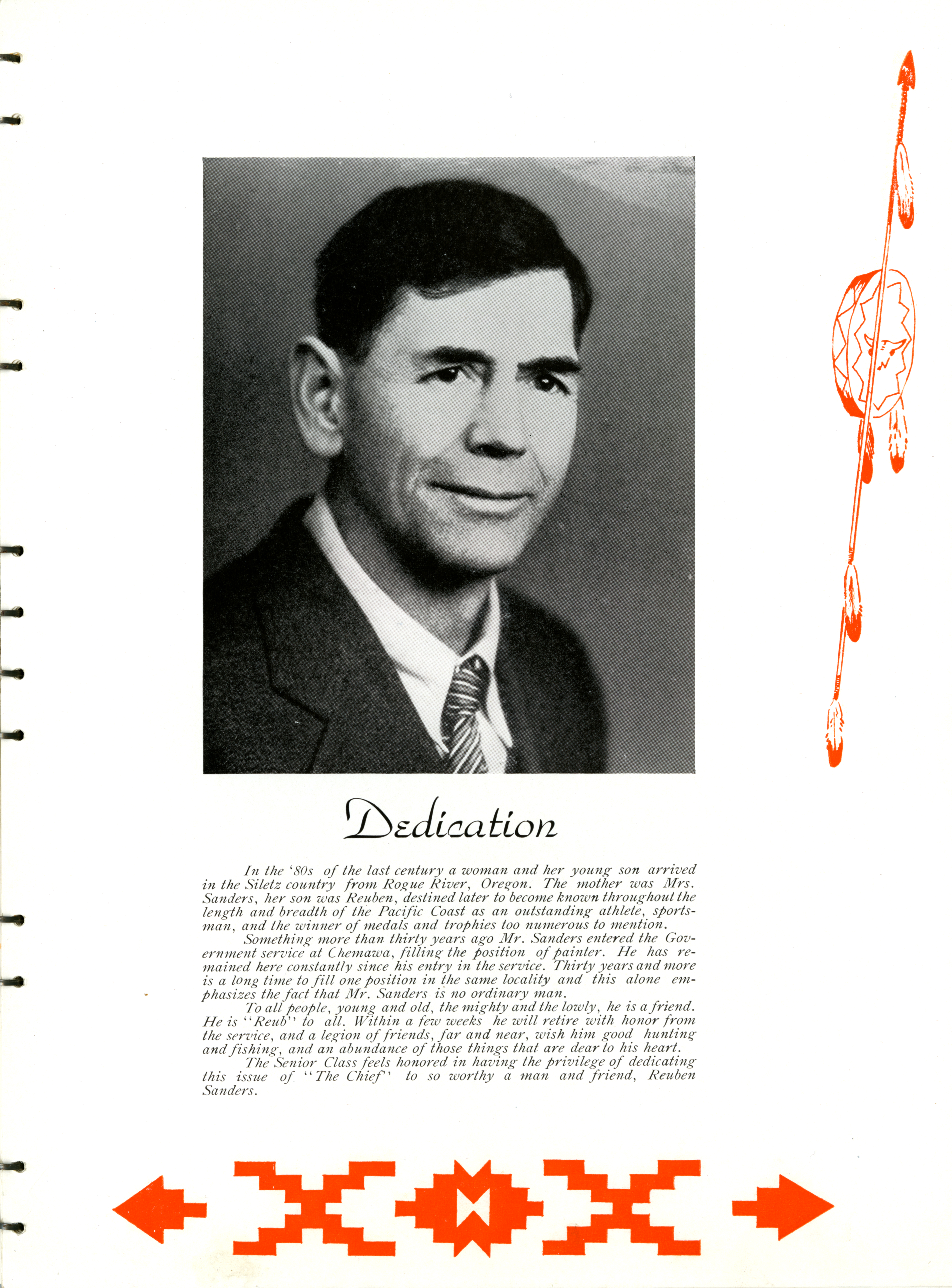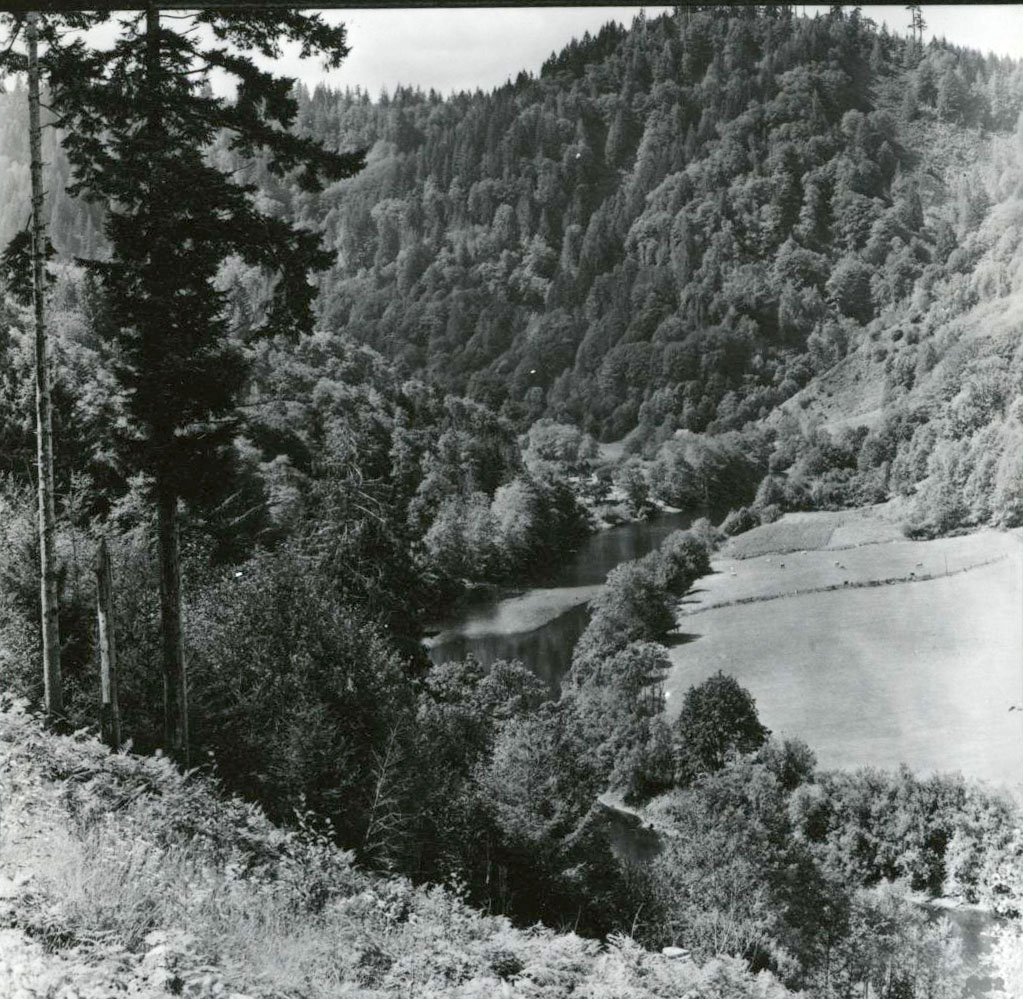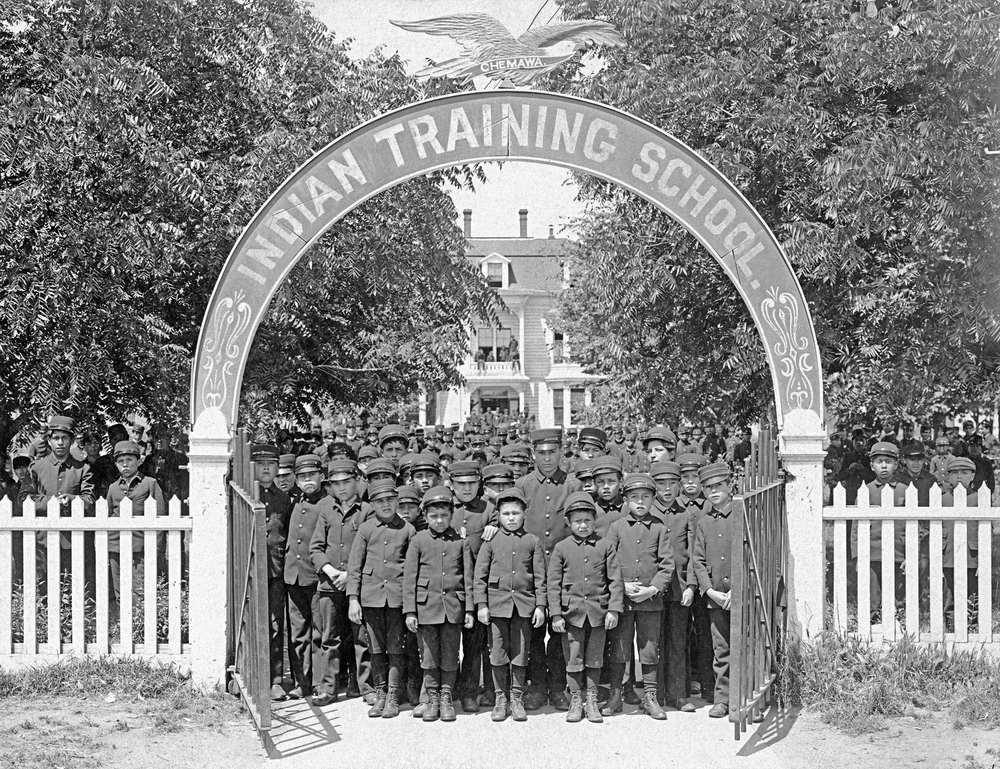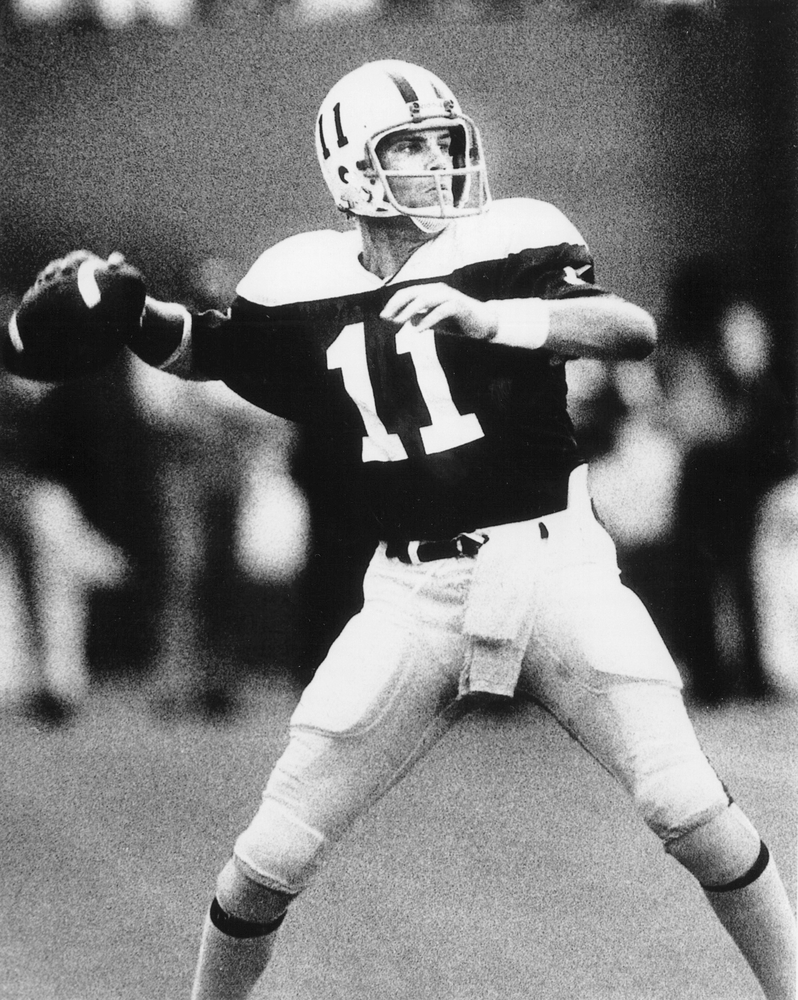Reuben “Reub” C. Sanders was one of Oregon’s greatest all-around athletes. He lived for most of his life in Salem, where he played and coached for Chemawa Indian School and competed in football, baseball, basketball, bike racing, boxing, wrestling, and nearly all track sports. He won a gold medal in basketball at the 1905 Lewis and Clark Exposition in Portland and held a state record in the shot put until 1906. Known as the Jim Thorpe of Oregon, Sanders was inducted into the Native American Athletic Hall of Fame at Haskell Indian Junior College (now Haskell Indian Nations University) in Lawrence, Kansas, in 1972 and the Oregon Sports Hall of Fame in 1999.
Born in Corvallis on July 10, 1876, Sanders was a member of the Siletz tribe and a descendant of the Joshua band of Tututni in southern Oregon. His mother Mary Monk moved to the Siletz Reservation in the early days, having walked up the coast from the Rogue River area; his father, John Sanders, was from Ireland. In 1894, Reub Sanders entered Chemawa Indian School. He graduated in 1900 and attended Willamette Preparatory College in 1904.
Sanders’s ability on the football field was legendary. He played nearly all positions and was known for his exceptional agility in the backfield and his ability to punt the ball as far as seventy yards (at the time, the punter held the ball and dropped it to be kicked while he was moving). He played for several city league football franchises and was known to participate in as many as five games a week.
Before 1910, there were fewer organized athletic leagues in Oregon, so colleges, universities, organizations, and schools such as Chemawa competed against each other through individual arrangements (athletes were not always required to be students in the schools they played for). During one season, four different organizations and schools hired Sanders to play against the University of Oregon football team. In 1899, while he was still a student at Chemawa, he represented Willamette University at an intercollegiate track meet. The University of Oregon and Oregon Agricultural College (present-day Oregon State University) complained that several athletes representing Willamette were not students at the university. An investigation cleared Sanders, but the complaint itself was sustained and the complainants severed athletic ties with Willamette.
In 1902, Sanders toured with the Chemawa football and baseball teams to play against professional teams in British Columbia, Washington, and California. He traveled with Chemawa to play football against Stanford University and the University of California-Berkeley. In 1903, he played a football season for the Sherman Institute (now Sherman Indian High School) in Riverside, California. Also that year Sanders was on the Multnomah Amateur Athletic Club football team in Portland and was first baseman for the Salem Raglans baseball team for the first game of the Willamette Valley League. While at Sherman in 1904, Sanders played football against Jim Thorpe’s traveling team, matching Thorpe’s two touchdowns to win the game.
Sanders played football for the Salem Capital Athletic Club (1900), Bishop Scott Academy, and Willamette University (1901-1918). In 1905, the Corvallis Times wrote that he was “one of the great fullbacks of the country, and a sight to see in a football game.” He continued as a player until 1918, when a broken wrist and arm ended his playing career.
In 1910, Sanders married Anna Bender (Ojibwe), the sister of Philadelphia Athletics star pitcher Charles Bender. She died at Chemawa in 1911. In about 1913 he married Augusta Chamberlin (Gros Ventre), who was on staff at Chemawa Indian School. They had three sons.
Sanders was hired at Chemawa as an industrial arts instructor in painting. In 1911, he was named a coach at the school, where he led teams in football, boxing, wrestling, and girl’s basketball. He later coached the All-Star basketball team of former students in the 1930s. Sanders retired in 1941 to a full-day feast and tribal powwow in his honor. After he retired, he became assistant coach of the football team for Coach Tommy Thompson (Warm Springs) at Chemawa, which won the class B state title in 1944.
In his retirement, Sanders joined the Siletz to help lead the salmon bake for the city of Depoe Bay. He continued to hike mountain trails, hunt, and fish, and he regularly played golf, achieving at least two holes-in-one at Salem's Oak Knoll Golf Course. Area elders remember that Reub attended all of the Chemawa home football games, driving his car up behind the home goal posts and sitting on the fender to watch.
Sanders died on December 20, 1957. The Reuben Sanders Field at Chemawa is named in his honor.
-
![]()
Reuben Sanders, retirement dedication, 1941, in the Chemawa Chief.
Courtesy Willamette University
-
![From the Chemawa Chief yearbook.]()
Sanders and the Chemawa basketball team, 1937.
From the Chemawa Chief yearbook. Courtesy Willamette University
-
![From the Chemawa Chief yearbook.]()
Sanders and the Chemawa boxing team, 1937.
From the Chemawa Chief yearbook. Courtesy Willamette University
-
![]()
Augusta Sanders, 1939, in the Chemawa Chief yearbook.
Courtesy Willamette University
Related Entries
-
![Alsea Subagency of Siletz Reservation]()
Alsea Subagency of Siletz Reservation
In September 1859, Joel Palmer, the Superintendent of Indian Affairs fo…
-
![Chemawa Indian School]()
Chemawa Indian School
Chemawa Indian School, located in the mid-Willamette Valley north of Sa…
-
![Fred Milton (1948-2011)]()
Fred Milton (1948-2011)
During a period of social and racial turmoil in the late 1960s, the Bla…
-
![John Joseph Harrington (1978-)]()
John Joseph Harrington (1978-)
The list of great quarterbacks at the University of Oregon runs deep an…
-
Neil Lomax (1959-)
Neil Lomax was the unlikeliest football superstar, a decent passer on a…
Related Historical Records
Map This on the Oregon History WayFinder
The Oregon History Wayfinder is an interactive map that identifies significant places, people, and events in Oregon history.
Further Reading
American Indian Athletic Hall of Fame.
Chemawa American Yearbooks (1927-1939). Willamette University Special Collections, Salem, Oregon.
Eugene Register-Guard, December 3, 1951.
King, Richard. Native American Sports. New York: Routledge, 2004.
Mills, Dorothy Seymour, and Harold Seymour. Baseball: The People's Game. New York: Oxford University Press, 1991.
Oxendine, Joseph B. American Indian Sports Heritage. Human Kinetics, 1988.
Powers-Beck, Jeffrey P. The American Indian Integration of Baseball. Lincoln: University of Nebraska Press, 2009.
Siletz Reservation. Indian census records.
Swift, Tom. Chief Bender's Burden: The Silent Struggle of a Baseball Star. Lincoln: University of Nebraska Press, 2010.
U.S., Census Bureau, Federal Census, 1910, 1920, 1930, 1940.
Wilkinson, Charles. The People Are Dancing Again: The History of the Siletz Tribe of Western Oregon. Seattle: University of Washington Press, 2010.












